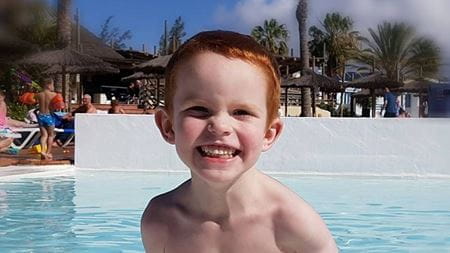The youngster had faced many challenges in his short life. At 14 months old he was diagnosed with liver disease, receiving a transplant two months later. His parents, Geoffrey and Chloe (who was expecting the couple’s second child) were therefore familiar with frequent and often extended hospital stays.
Towards the end of March 2017, Caleb required a tonsillectomy but, given his medical history, it was deemed safer to conduct the operation at UHS rather than locally on the Isle of Wight. At 4:30 pm on 22 March 2017 Caleb was admitted to the hospital’s Piam Brown ward (the regional paediatric oncology and haematology unit for Wessex) so he could be nursed in a low risk environment given his weakened immune system.
The operation took place on 23 March 2017 but Caleb had still not come round from the anaesthesia the following day. Tragically, his condition deteriorated rapidly and his life support was withdrawn.
The coroner, Grahame Short, concluded that the combination of drugs used to sedate Caleb were not unreasonable. He also accepted that a series of missed opportunities to recognise, identify and treat symptoms may, in all likelihood, have contributed to Caleb’s death.
The purpose of an inquest is solely to determine who died, when they died, where they died and how they came by their death. The coroner cannot and does not apportion blame. Since Mr Short was unable to establish a definite causation and determine why Caleb did not wake spontaneously from the anaesthetic, he delivered a narrative verdict concluding that Caleb died due to the effects of the general anaesthesia, principally through an ischaemic brain injury following the operation.
After delivering his narrative conclusion, the coroner said:
‘Caleb was a little boy who was very deeply loved. There is nothing I can say that will console or reduce the feelings of loss. Although it was not possible to make a final determination, I hope that this inquest has given a better understanding of what happened to Caleb.’
The family was represented at Inquest by Sue Prior, a senior associate in Shoosmiths' medical negligence team. Sue said:
‘The family came desperately close to losing him pre-transplant and wanted answers as to why Caleb died the way he did. While the verdict may not have been entirely what they had hoped for, through the process of the inquest they have at least had the opportunity to hear evidence from the Trust and the treating clinicians and gain a better understanding of the events that led to this tragic outcome.’
For further information please contact:
Allan Bisset
Phone: 03700 866736
Email: [email protected]

Pictured above: Caleb Smith during a holiday
Disclaimer
This information is for educational purposes only and does not constitute legal advice. It is recommended that specific professional advice is sought before acting on any of the information given. © Shoosmiths LLP 2025

















